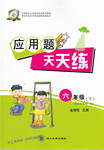题目内容
Having finished her own painting, Mary went on others in the art class.
A. helping B. to help C. with help D. having helped
练习册系列答案
 应用题天天练四川大学出版社系列答案
应用题天天练四川大学出版社系列答案
相关题目
题目内容
Having finished her own painting, Mary went on others in the art class.
A. helping B. to help C. with help D. having helped
 应用题天天练四川大学出版社系列答案
应用题天天练四川大学出版社系列答案